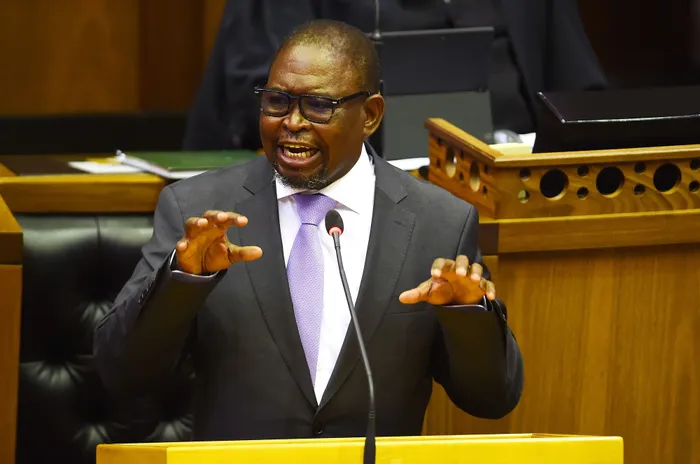Civil society, unions fear cuts in Godongwana’s medium-term budget

The Finance Minister in a suit gestures with his hands as he speaks in Parliament. Finance Minister Enoch Godongwana delivers his Medium-Term Budget Policy Statement (MTBPS) today. Picture: Phando Jikelo Independent Newspapers
Durban - Civil society organisations and unions have raised concerns over anticipated budget cuts to health, education and criminal justice when Finance Minister Enoch Godongwana delivers his Medium-Term Budget Policy Statement (MTBPS) today.
They say austerity measures will not stimulate the economy and bring down the unemployment rate, and will further stagnant economic growth as the country deals with corruption, crippling load shedding and dysfunctional municipalities.
Godongwana has warned that if the country does not cut expenditure and increase borrowing, it will be out of cash by the end of March 2024.
A joint statement by organisations including the Institute for Economic Justice, Black Sash, the SACP, South African Federation of Trade Unions and others, said previous budgets have revealed National Treasury’s continued commitment to curbing spending on services, grants and infrastructure.
They said research rejects “this austerity philosophy, that cutting government spending will resolve the long-standing growth and social crises as well as the debt trajectory of our country”.
“Instead, the fiscal framework needs to be used to advance inclusive development.
“We are calling on the minister of finance to intentionally put the constitutional rights and well-being of communities and workers first over narrow and often unjustifiable budget deficit targets, that will do little to alleviate the crisis of unemployment, poverty and inequality and build a more inclusive economy,” the statement reads.
They warn that failing to fund social provision can erode the credibility, performance and quality of the medium-
term fiscal framework.
“Over time, this can weaken effective public administration and negatively impact clear oversight, participation and control over the budget.
“Over the longer term, it is not clear how much further and how much longer government spending can be cut without aggravating South Africa’s deep political fissures, leading to social unrest.”
The National Education, Health and Allied Workers’ Union said it was expecting “draconian cuts across the board” and stood ready to protest against “austerity expansions”.
“South Africa faces a worsening triple crisis of unemployment, inequality and poverty which has metastasised into a crisis of social reproduction.
“Life for workers, the unemployed and the poor has become impossible, with 42.1% of South Africans unemployed and 60.7% of South African youth not being able to find work,” said the organisation’s secretariat.
The union said fiscal consolidation measures will have a particular impact on the capacity of the state to deliver service in health, education, policing and other social services to people.
“We will continue to stand up against the public service wage bill austerity, and prevent the National Treasury from oppressing the public service workers; if the unjustifiable government’s action to downsize the wage bill is left unchallenged, the public service will suffer injustice.”
Equal Education’s head of research, Elizabeth Biney, said they were anxious and concerned that the allocation for education would be reduced far more than has been anticipated.
“We are aware that the education budget will not fare well but we are bracing for an even deeper cut.”
She said basic education is an immediate realisable right and government is meant to take quick steps to address the dire inequality in the sector.
“This is meant to be addressed in our lifetime, but these cuts delay this from being achieved and learners bear the brunt of decisions made by government.”
Cosatu spokesperson Matthew Parks said they had been astounded by attempts to impose misguided austerity budget cuts across government, including freezing vacancies and infrastructure investment programmes.
He said while they appreciated that the state faced fiscal constraints and there was a need to cut fat and reprioritise expenditure, the solutions offered will choke the economy and undermine the state’s ability to provide quality public and municipal services.
“What is needed is to grow the economy, but Treasury’s narrow fixation on cutting the wage bill is a lazy option that will not resolve the multiplicity of crises the country is facing.
“Underpaying a nurse will not get the trains to run on time,” Parks said.
The Federation of Unions of South Africa said austerity measures must only be implemented to cut unnecessary expenditures, describing the costs for the employment of many Cabinet ministers, “whose volume does not match their dismal performance”, as one such expense.
Related Topics: